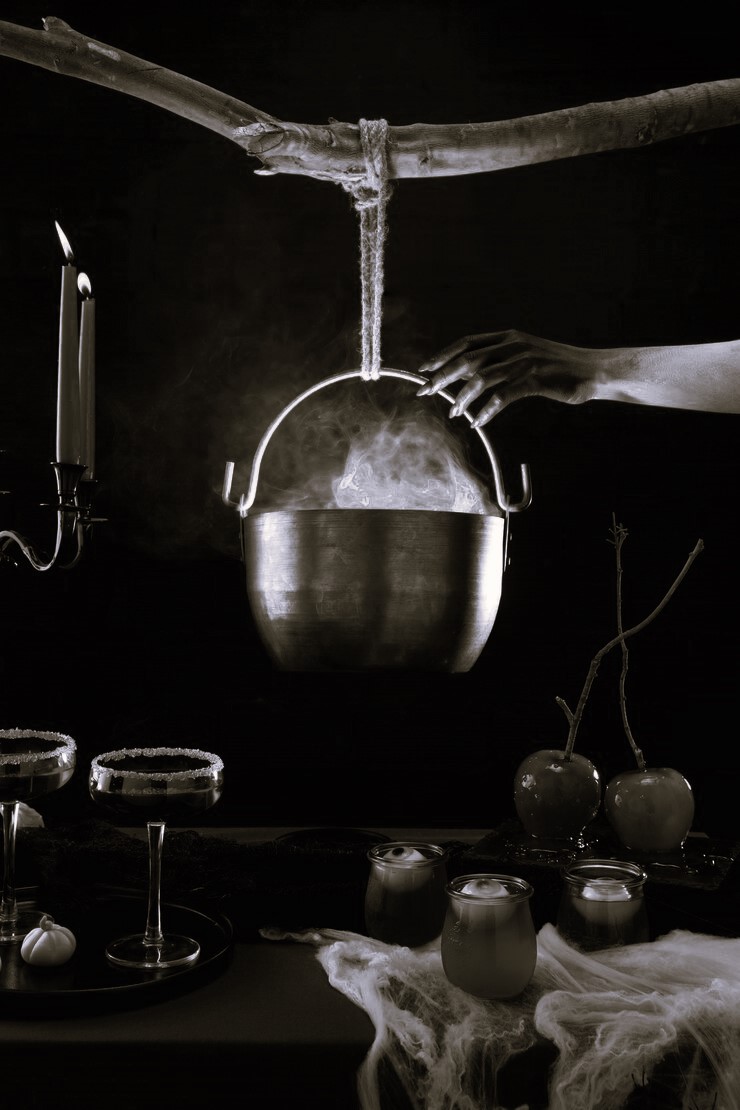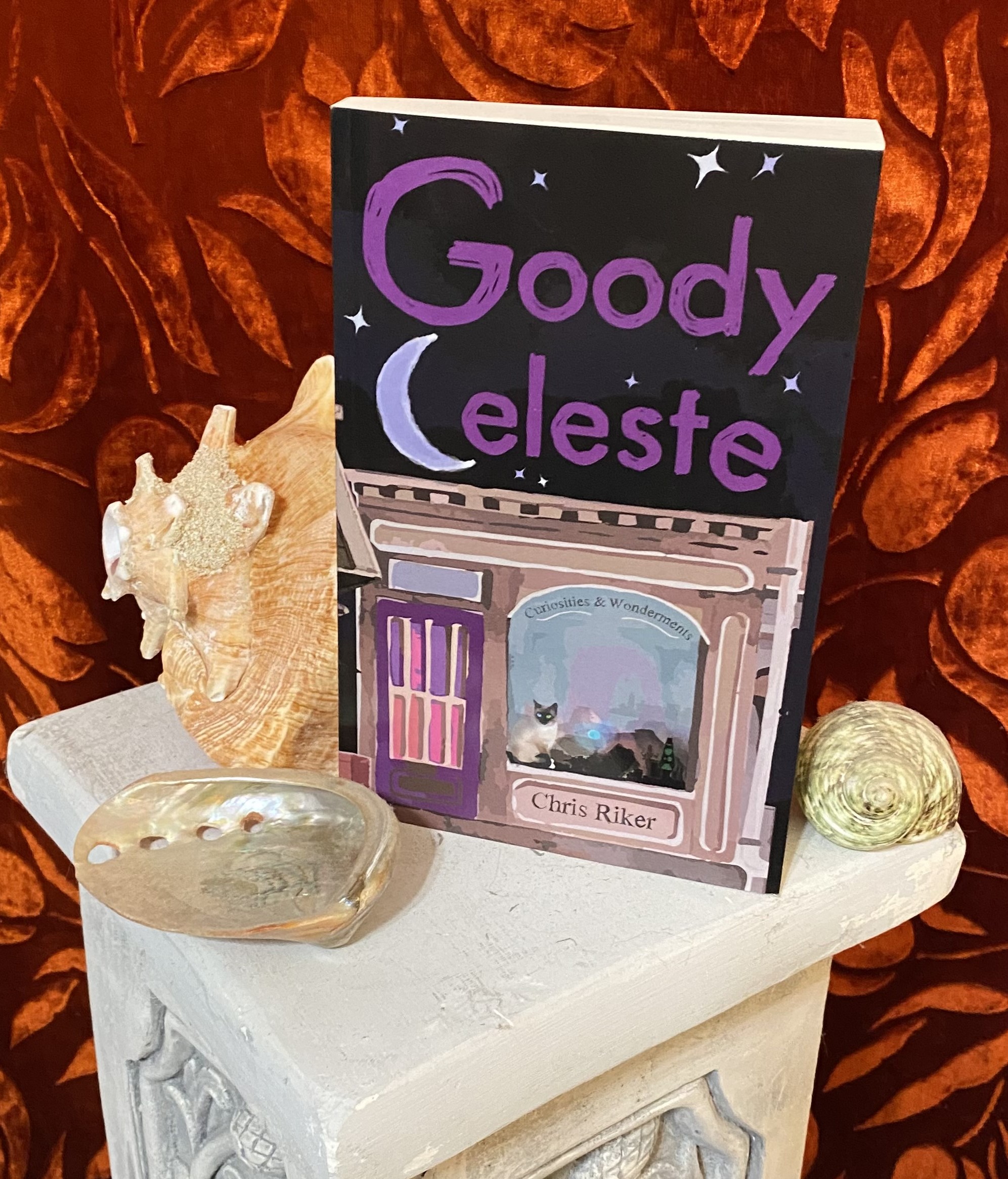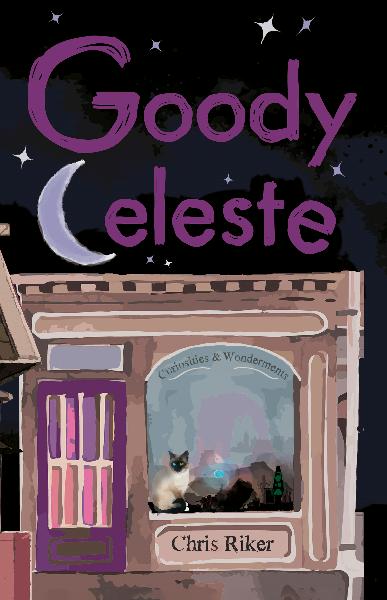

K’ktlrtq – So hungry. *palps testing strands* Come. Come, aphids. Come, juicy ’squitoes. Gnats, welcome, one and all. Patience. Work done. Much work. Good work. Trap is strong. Patience. *slit sensilla awaiting movement*
Mason loved the subtle shift in the autumnal rhythms, the ever-surprising face of nature, but how he dreaded this annual chore. Every year at this time, the Carey porch stood laced with their geometric abattoirs. This year had brought a fine bunch, indeed. Gossamer streamers ran from the hanging light to the bannisters and posts, to the trim, and to the front door itself. Speckled throughout the elegant silk ladders were uncounted corpselets. The happy diners were argiope aurantia, yellow garden spiders. They were ghastly, shocking even, but mostly harmless.
Mason raised his broom then froze.
“They aren’t hurting anyone,” he called into the house.
Bettina called back, “They’re disgusting, that’s enough. They make my skin crawl. The girls will be here any minute, including Shelby,” (the plant manager’s wife!) “and I don’t want those gross things on my porch.”
There was no getting out of it. He was helplessly snared in domestic servitude. Mason took his best swing, ripping away hours of work on the part of the biggest yellow-and-black brute. Down came the skein of death along with its macabre ornaments. Mason hung the business end of the broom over the railing and shook it violently in a vain attempt to dump the sticky webbing.
“Whoa! Watch out!” It was Bettina’s friends coming up the walk. The three of them climbed the porch stairs, chattering and making faces at the remaining webs.
“Missed a few,” Shelby said, pointing and shivering. “You do know we make sprays, right?”
Mason did know, of course. He’d been at the Doraville plant long enough. He didn’t trust the sprays they made there; he knew what nasty crap went into them. Besides, he had the broom. He struck a heroic pose, holding out his weapon in the direction of the spiders. “You shall not pass!”
Unimpressed, the women filed by him and into his home. Bettina’s home. Mason’s shoulders slouched. Just then, he felt something on the back of his hand, the one holding the broom. It was yellow and black and looking up at him with eight eyes as dark as shadows in a grave.
K’ktlrtq – Web spoiler! *cephalothorax up* Hate. *chelicerae displayed* Bite? Bite? Juicy. No. Too big. Patience.
A toddler’s scream escaped Mason’s middle-aged mouth. He threw the broom to the floor of the porch with a clatter. He shook his hand, half-hoping it would detach from his wrist. Anything, as long as he got rid of the damned spider. Instead, the thing jumped and made a soft landing, scurrying under a warped baseboard before Mason could stomp on it. Its fellow spiders hung around, unperturbed, waiting for free food to land in their webs.
“You all right out there?” his wife called.
“Fine, baby.”
One of the women giggled, “You should call an exterminator.”
Resignedly, Mason went inside and headed to the kitchen. He’d finish his chore with a beer in hand.
K’ktlrtq – So hungry. Climb. Choose anchor points. *spinnerets active* Spray silk. Busy. Busy. Busy. Rebuild. So hungry. Patience.
***
Fhftkk – Corner. Hidden. Be the secret. Observe. Learn. Patience.
A good fifteen years his junior, Operations Chief Dagmar Metcalf ruled from the corner office. She’d strategically placed several Dawgs pennants and other memorabilia around the room. It was no small coincidence that Dagmar and the plant manager were both UGA alum. One picture showed them chumming it up with Herschel Walker. Mason had graduated from Georgia Tech with a Masters of Chemical and Biomolecular Engineering. He could have been a Rambling Wreck, except he hated football.
“So, I see you’ve been with us for nine years now… Mason.” That pause. Had she really had to glance at his file to get his name?
“Yes,” he said. He’d spent eleven years here at Achlys Global, after finishing two stints as an Army MP and then getting his degree. AchGlo had given him a few important jobs over the years, but mainly he handled shift work, running quality control, inventory, even manning the loading docks when needed. He was hungry for something challenging.
“You have decent credentials.” She leaned back behind her mahogany desk in her chair – a five-thousand-dollar item, according to the rumor mill. “I’m putting you on The Team.” There were forty or fifty teams at AchGlo, but only one was The Team. It was the company’s best R&D squad. Each of the eight members of The Team were wrapped up mummy-tight in NDAs. Rumors cut paper, however, and there was talk of an impending breakthrough. Some new bug spray that would leave the competition flat on its back with its legs twitching in the air. Being king of the mountain meant owning it. Bug Mountain was made of solid gold.
“Walk with me.”
The two made their way down to the plant floor. It was a cyclopean space of tanks and pipes and workers in protective clothing. Mason and Dagmar donned lightweight masks. They boarded a utility cart and rode the length of the installation.
“The Dawgs could play four national championships in here end to end!” Dagmar joked. The quip made little sense, but Mason laughed as sincerely as he could manage.
The cart pulled up to a reinforced steel hatch. Dagmar pulled out her phone and keyed in the code. The two-ton, twenty-foot steel maw yawned, and they drove into a white void. The walls of the air lock were featureless. Mason spotted the faint outline of a door, but there was no handle on this side.
The vault door closed behind them.
A moment later, the inner door’s latch clicked and they stepped inside. It was a conventional-looking lab. The equipment was a mix of state-of-the-industry mecha and two or three set-ups he did not recognize, the real cutting-edge stuff.
A man and a woman approached them, dressed in casual clothes. The man wore a bright red Spider-Man t-shirt and Birkenstocks. Mason and Dagmar took off their protective masks.
The woman technician spoke. “So, you’re Nyumah’s replacement. Carey. Good to have you.” They shook hands. The woman’s badge read Dr. E.B. Hols. “You’ll meet the others in passing.”
“Welcome to… the lair,” Spider-Man said with a delicious Saturday Night Movie Macabre inflection.
“I’m excited to join The Team. I’ve heard so little about you.” It was a joke.
“I hope so,” Dr. Hols said with not so much as a grin.
“Which reminds me: shouldn’t I have signed something to get in here?”
Dr. Hols said, “Getting in is easy. You have to sign your name in blood before we let you go home again.” That was not a joke. “Let me show you why.”
The tour took them from lab to lab, each redolent of plastics and disinfectant. Dr. Hols explained how the isolation protocols allowed them to seal off the three most sensitive chambers. As promised, Mason said a quick hello to the others: Ryu, Poquelin, Deloitte, Armagh, and Smed, who insisted on being called Arlene though her badge read Donald. Compared to them, Mason was an old fart.
Each lab had a generous supply of the latest screen devices. Every screen displayed the company logo. Eager to show his proficiency with most of the equipment, Mason blurted out detailed descriptions of each gadget before Dr. Hols had the chance. In a purple-themed room, however, Mason said, “Hello. What is this beauty?” He stepped over to a chamber containing ultra-fine articulating arms and bespoke utensils mounted in the ceiling. On a table inside were small clear containers, alive with activity.
“Keen eye,” Dr. Hols said. “We call the rig Nidhogg.”
“The hungry dragon,” Dagmar added helpfully.
Mason didn’t need the help. “Insatiable, is more like it. Everything reflected in Nidhogg’s eyes was food to Nidhogg. Even corpses. So the old stories go.”
“Indeed.”
“Any idea how many insects there are on Earth, Carey?” the man in the Spider-Man shirt and Birkenstocks asked. He wasn’t wearing his badge, and Mason had already forgotten which name belonged to him.
Mason did know the answer to that question. It was a number he saw in his nightmares. “A lot,” he said glibly.
“That many,” said Spider-Man, pointing to a plaque mounted inside the chamber. It read: 10,000,000,000,000,000,000. “Ten quintillion.”
Mason suppressed a shudder. “Like I said, a lot. In fact, I got into the bug-killing business because my father ran into a few thousand brown widows. They killed off a mess of our herd over the years. The sprays didn’t slow them down much. They’d developed a resistance. In the end, the losses broke him.”
“Exactly,” Dr. Hols said. “That’s the downside. Bugs adapt quickly. Too quickly.”
Mason amplified her thought. “Besides, our sprays tend to kill good insects along with the destructive ones. The worldwide bee population –”
Putting a firm hand on his should, Dagmar said, “This is the wrong room for bee-hugger propaganda, Mason.”
Mason shut up.
“Of course, most of the Doraville plant is given over to finding the perfect bug spray. Sprays for household roaches, sprays for farm pests, sprays for anything we don’t like to think about crawling around in the dark.” Dr. Hols spread her arms wide. “The problem is they’re building up resistance. Fast! This lab has a different mission. Here, we are learning to harness the greatest bug control on Earth.” She nodded to Spider-Man.
He touched something, and every screen came alive with data. It was more than Mason could take in at a glance, of course, but the theme was unmistakable. It matched the specimens in the small clear containers inside Nidhogg.
“Spiders,” Mason sighed.
“Spiders,” Dr. Hols confirmed.
Mason straightened his back. “Hungry spiders.”
His new colleagues laughed. Dagmar patted him on the back.
Dr. Hols said, “Welcome to The Team!”
***
Mason came home to chaos. The school had suspended Chas for threatening another student.
“He’s a douche. I just said I wish he would choke to death. What? I didn’t even touch him,” the boy pleaded.
“Good one, bro,” his younger sister Cheanna chided. “On the bus in front of everyone. They recorded it. You’re famous.” She held up her phone and played the news clip.
Bettina urged Mason to deal with Chas. “He needs to learn the right way to be assertive – if you think you can handle that job.”
Mason dutifully took Chas aside and read him the riot act. Chas contritely agreed to “never do it again,” then put his earbuds back in and went to his room.
It wasn’t until dinner was over that Mason got the chance to break the news to the family. “I got a promotion. I can’t tell you the details – you wouldn’t believe the pile of papers I had to sign.”
“You’re on the Spider Squad,” Bettina laughed. “Oh, I’m sorry… The Team. Shelby told us.” Us. The other women knew, too? Well, if this blew back in his face, he could honestly say he was not the source of the leak.
It was funny how some things got out.
***
DNA manipulation was not on Mason’s CV; however, he knew all about finding the right biochemical catalyst to support the action. He decided it was worthwhile to socialize, to talk shop and learn where his skills landed him in the pecking order.
After work, he asked his fellow grunts out for a beer at The Three Dollar Café on Chamblee Tucker Road. Carl Deloitte and Tomiko Ryu were making eyes at each other. They stayed for one quick drink then made convenient excuses and took off. They were cute. The others let it go with a few raised eyebrows. That left Mason with Arlene Smed, Spider-Pete (his name really was Peter!), and Sean Armagh, a nervous type who looked like he cut his own hair.
By her second brew, Arlene was a total chatterbox. “It’s all rough numbers, of course. Kinda tricky to count the footprints and divide by eight. Still, our best guess is that spiders alone number 21 quadrillion. That’s nearly three million spiders per human being. Each spider can eat its own body weight in ten days, hundreds of millions of tons per year. They could devour the human race down to the last pinky toe in just one year.” She gulped down some pills to “even things out. Adrenaline messes with the hormones.”
He decided not to ask her whether mixing beer and pills was a good idea. Instead, he egged her on, since she seemed determined to ignore his expertise and transplain spiders to him. “We’re still here.”
“The only reason they don’t chow down on us,” Arlene continued, “is because, luckily, they like to eat each other and other bugs.”
Mason said, “And we’re fiddling with that.”
Sean butted in, saying, “We have to. Our projections show insecticides will be useless within a decade, at least at concentrations that won’t instantly kill humans, too. So… the plan is to tweak the spiders’ natural propensities. We boost certain innate skills and increase their appetites and make them prefer the bugs we choose for them to munch.”
Spider-Pete said, “We’ve been focusing on two very different hunters. Carolina Wolf Spiders and Black Widows.”
“Two nasty bastards.”
Dqtkyb – *spinnerets busy* Lower. Lower. Lower. Human drink. Mmmmm. *drop*
Sean leapt up from his stool, spit out his beer, and cursed loudly enough to turn heads. The bartender brought him a replacement drink.
***
By the third week, they were ready for a key trial.
“If PETA comes knocking, Dagmar will have your peen in a pickle jar,” Spider-Pete told Mason. He wasn’t kidding. Today, he’d switched his ensemble to a Venom hoodie.
“Your closet gives me nightmares,” Tomiko said dryly. “The labs came back. The key markers all read stable. Your arachnaegoo seems to have worked, Mason.” The gang applauded, and he took a bow.
“I have one question,” Mason ventured. Two of his teammates were rigging Nidhogg with a new test subject, a chicken. “The idea is to get the spiders to eat bad bugs. Should we be testing these spiders on animals we ourselves like to eat?”
“Odile?” Dr. Hols directed the question to the cute (watch it, Mason!) triple-masters tech, Dr. Odile Poquelin, the project’s rock star.
“Ça roule. I’ve already mapped the tactile response chromosome pairs in the hogna carolinesnsis’ genome. That should have taken my lifetime, but I want my first Nobel Prize before I hit thirty, so I designed that AI unit in the corner. One-of-a-kind.”
Arlene added, “We call it The Count. ‘1-2-3 chromosome pairs... ah-ah-ah.’”
These kids were watching Sesame Street up til last week, Mason thought.
“I broke the code. C’est moi,” Odile beamed. “Then I had to get the nucleic acid chain to hang together long enough to yield a fertile Wolf ovum. The magic spidey jizz – that’s the scientific name we’ll write in the journals – appears to have given us this. If all goes well today, these spiders should be even better than the earlier batches. Now, we test our latest enhancement to appetite. Then we’ll destroy this batch and program the next bunch with the right menu. We should probably make them mules while we’re at it. Sterile. Extra safety precaution.”
Mason tried not to smirk. Ravenous, impotent spiders. Odile’s French accent somehow made it all sound sexy.
“Nothing left to chance,” Dr. Hols said.
“And don’t worry, Mason,” added Spider-Pete. “After our test subjects go to work on Henny Penny, you’ll swear off KFC for life.”
“Clear!” Dr. Hols called. Odile and Arlene did one last visual check of the test chamber. “I said clear!” Both cursed and hurried out just as the door sealed behind them.
The hapless chicken was chained by its ankle to the tabletop. It appeared oblivious to the mess it had made and to everything to come.
“Whenever you’re ready, Pete.”
Spider-Pete grinned. He poked at his pad. “10-9-8-7- psych!” He punched a red square on the pad.
Two feet from the chicken, a small door opened on a carefully-designed box. At first, nothing happened. Cameras focused on every possible angle, in extreme close-up.
Odile smiled. “You’re not délicat, are you, Mason?”
“Moi?” he bluffed.
The wolf spiders erupted from the opened box.
Iktakk, Tf’fbkq, Yykgtt, Gmnntk, Tk’ks’sx, et al – Weeeee! Faster, Mama! Weeeee!
They were normal enough in appearance, possessing a scraggly-haired brown body with a darker stripe down the abdomen, two eyes up front, two smaller eyes above and to the side, plus four more tiny ones in a third row below. This gruesomely efficient array sat atop two fang-like chelicerae with which it delivered venom.
The group, which numbered precisely one hundred forty-eight, surrounded the chicken. For a brief moment, the bird stood there looking stupid. Then, the arachnid army leaped into action. They easily jumped all over the chicken, which still failed to realize its situation. The Wolves began to move. Now, the chicken’s wings flapped wildly, and it began to squawk in an unholy manner. The spiders began sinking their fangs into its flesh, preparing to dine.
Mason felt himself getting light-headed. “I grew up on a farm. I’ve seen my share of chickens eaten by coyotes. This is – different.” He hated chicken coops. He hated chickens, too, but he did not wish to see anything endure this.
“No worse than being served up as McNuggets,” Dr. Hols said. “The end result is the same.”
Spider-Pete said, “I think we have the data we need, right? I mean…”
“I’m satisfied,” Odile said. The others looked up from their monitors and called out in the affirmative.
“Very well,” Dr. Hols said, and Spider-Pete pressed another square on his pad. There was a loud hiss. The chamber decompressed in three seconds. The chicken flopped over. Air then refilled the small test chamber. The diners never missed a bite.
“The spiders lived through that?” Mason asked.
Carl explained, “The girls, yes.”
“Girl power!” Tomiko said. “Eat those dead boys!”
Carl winked at her. “Now, we just wait and see how long it takes them to… finish.”
The carnage continued.
Mason excused himself and found the restroom. Somehow, he did not hurl. “Thank you,” he said to the ceiling panels.
As he was splashing water onto his face, a visitor descended from above on a slender line of its own making. Wiping himself with a wad of paper towel, Mason found himself face-to-face with the spider. It seemed to hover near him.
Tkqrrt – Human. *cephalothorax up* Ugly.
“What are you doing here?” Mason asked the little fellow.
A hand slapped against the mirror. When Odile took her hand away, only a drop of dark fluid remained on the glass. “Not one of ours.” She washed her hands in the sink, using extra soap from the dispenser.
Mason sighed, “I keep forgetting these are unisex bathrooms. Have to be careful.”
“I’ve seen a 99-million-year-old daddy long legs frozen in amber with a… grosse érection. I don’t think you can make me blush.” She flashed him a killer smile.
***
The following Thursday morning, Mason was busy running the numbers on his latest catalytic formulation when he went deaf. The research labs were extensive, and yet they were all contained, so the blast of the klaxons caused him to clutch his ears.
Odile burst into the lab, white-faced. “Where’s Hols? She has to order this.”
Spider-Pete came running in to see what was happening. “Hols is in lab two,” he said.
All of them bolted in that direction. They found Dr. Hols on the phone with the plant manager. “We’re sealing the lab now.”
Mason felt lost in all the excitement. “Someone want to tell me what’s going on?” he screamed, his final words continuing as a shout even as the alarm went silent. The flashing red lights over the doors and on every screen continued, however. So did his raging nerves.
“Where are Armagh, and Smed?” Odile asked.
“Here,” Sean called out. He stepped into the lab, followed closely by Arlene.
Odile and Dr. Hols exchanged a charged look.
“Suit up! Now!” Dr. Hols ordered. The six of them made it to the locker room and began donning protective gear.
They were now six.
Tomiko and Carl? Mason wondered.
“Odile, where are Ryu and Deloitte?” Dr. Hols demanded.
Odile led them through a conventional door and into a storage room behind the main lab. The lights were out, so the team members used helmet torches. It was a mess in there. Everyone was in and out all day grabbing items without ever tidying up.
“Behind that stack of supplies,” Odile said, pointing. She froze where she was, apparently unwilling to view for a second time whatever had caused all the panic.
Mason soon regretted looking behind the stack. Judging by the sizes of the remains, this was Ryu and Deloitte. Black Widow spiders were swarming over what was left of Tomiko, who was a pale, desiccated husk shrouded in silk. Her mouth hung open in an impotent scream. Her empty eye sockets gave the impression of astonishment. There was no webbing on Carl’s body. Wolves had stripped all the soft tissue, leaving his legs and one hand oddly intact. They apparently hadn’t gotten to those yet. The hand was curiously crooked into a claw, a final expression of exquisite defeat and mortal resignation.
It was Dr. Hols who summed up the situation. “I’d say we now have conclusive evidence our subjects can be made more ravenous than they are in nature.”
“Our guys are really good in the dark. Terrific hunters,” Spider-Pete observed in a hollow manner that suggested his brain was on autopilot.
Arlene was more pragmatic. “Let’s get out of here.” Without a word, they all backed out and shut the door. Several spiders followed them, coming out from under the storage room door. No one indulged in the urge to stomp them.
“How did they escape?” Sean asked weakly. “I thought we count every spider, out and back into the holding boxes.”
Odile said, “I programmed the computer to do head counts. It can track millions of individuals at once.”
“Fuck!” agreed Mason. “Your pricey AI wasn’t smart enough to consider that some of those individuals were mothers with babies clinging to their cephalothoraxes. Over time, some got free. Hitched a ride in our clothes, maybe. Wolves and Widows! They’ve been breeding back here for weeks. Back here, and maybe…”
“We’re screwed,” Arlene sighed. Dr. Hols made a stern face, but Arlene had merely said aloud what everyone else felt.
“Don’t think about it,” Odile echoed.
“I am thinking about it.” It was Dagmar’s voice, coming over Dr. Hols’ phone. “I’m sending in a team. Secure your test subjects. Anything else will be killed.”
As they made their way back to Nidhogg’s purple lab, they felt the vibration passing through the flooring. The lair’s outer hatch was opening. “Jesus, Dag! Shut that damn hatch!” Dr. Hols began frantically jabbing at her phone. Odile had called up a security camera from the white airlock. Two men in body armor were making their way inside. One carried a BCM Recce 16; the other had what looked like an army surplus flame-thrower. The fools did not close the main hatch behind them.
Mason adjusted the security camera, zooming in on the white floor near the hatch. The resolution wasn’t high enough to be certain, but he thought he saw something moving. Long moments later, the giant hatch slowly swung closed again.
The security team found their way to the scientists. “Where are they?” They demanded. Several of the scientists merely pointed in the direction of the storage room.
P’kqtrg – Humans! *cephalothorax bobbing* Danger! Run, comrades! Save the spiderlings!
The two men went to work, one spraying the area with flame; the other, unaccountably with bullets. Overhead foam sprinklers immediately doused the whole room, making visibility virtually impossible.
P’kqtrg – No! Hate. Bad humans make fire and death. Now. We jump! Bite bad humans. Spoil bad humans’ things. We will –
“You missed a spot, Erroll.”
“The hell I did,” Erroll answered, unleashing another fiery blast, sending spiders, burned flesh, and foam everywhere.
***
Thirty minutes later, the eight occupants of the lab sat in the break room. Two were smiling and happily eating sugary cakes from the machine. Their helmets and weapons lay on the table in front of them.
“Burning that brood didn’t solve anything,” Dr. Hols said matter-of-factly.
“Made me feel good,” said Erroll, an aging vet with tattoos on his neck. His buddy nodded.
Dagmar was staring at them from several of the screens. “Due diligence. We’ll get you all out next, then we’ll finish the job. Incinerate the whole lab.”
“That would destroy the test subjects. At least three years’ work,” Dr. Hols protested.
Dagmar insisted, “It can’t be helped. I want you to transfer all of the data from your laptop.”
Dr. Hols sipped her coffee.
“Eva? Did you hear me?”
By way of reply, Dr. Eva Hols cut off the video call. The two security men were fidgeting and asking what was happening, as Dr. Hols reached into her side pouch and produced a neon pink pistol.
“Jesus!” Erroll cried, even as he leveled the BCM at Dr. Hols and pulled the trigger.
The automatic weapon made a muffled clicking sound. Something soft was blocking the internal action. Erroll looked down and ran one finger over the breach, turning it upwards to find a tiny stain.
In a single, smooth motion, Dr. Hols aimed her pistol and shot both security officers in the head. They fell like unstrung puppets.
Mason’s mouth hung open. No one said a word.
They moved back to the purple lab.
“3D printer,” Spider-Pete observed as soon as he could get the words out. “But, the bullets?”
“My little secret,” Dr. Hols replied, slipping the pink pistol into her lab coat pocket.
Mason stared at her. “Wh-Why?”
“If I had turned over the data, they’d be just as dead. So would all of us.”
Odile amplified Mason’s worst fears. “Fail-safe. We work inside an incinerator. Five-thousand degrees. It would get the spiders, the eggs, everything.”
“Including us,” Mason said.
Sean fell into his chair.
Dr. Hols continued, “I’m the only person on Earth who can release that data, or not. I have my own fail safe. Unless I key in my code every twelve hours, this laptop wipes it all. Poof!”
They wound up repeating all of this for the sake of the well-dressed audience in the front office, including the plant manager and Dagmar.
“Think about your families,” Dagmar spoke in a voice any predator would envy.
“You leave them out of this!” Mason screamed, picturing Chas and Cheanna’s faces.
“We’ll see,” Dagmar said, almost casually. “What’s your play, Eva?”
“We wait, Dag,” Dr. Hols said. “I need to test some of our control methods. Meanwhile, I strongly suggest you seal the plant and bug bomb it. Fast.”
The plant manager looked panicked. “You’re saying the plant has been compromised?”
“Probably months ago. They’ve been hiding, but I think… they’re going to make themselves known. Soon.”
***
They waited three full days and nights. No one got much sleep. They wanted to phone loved ones, but the plant’s wi-fi had vanished. Reception was spotty at best inside the shielded lab.
“What if they get out?” Mason asked. “I mean, really get out. What if they start infesting Doraville and Atlanta and… everywhere? Is that it for humanity?”
“This can’t be the end of the world. It just can’t,” Sean insisted.
“Why not? It’s got all the right ingredients: hubris, greed, stupidity.” Arlene put her fingers to her lips in a chef’s kiss. “But, no. Most likely what we have is a temporary anomaly among spiders. Hunger makes them bold, which makes them careless. Birds and some other critters get a crawly buffet. Moreover, if the Wolves and Widows don’t get their preferred meal, they’ll eat whatever’s closest – each other.”
Dr. Hols added, “This is not evolution. We’ve created a temporary, invasive species. With luck, they’ll face extinction in the short-term. Say, a few decades or so.”
“How many people will die in that time?” Mason asked, not expecting an answer and not getting one.
“We’re doing what we can. The crews opened up every cannister of spray in the plant. Fortunately, we’re on a separate air supply.” That was three days ago. Dagmar and the plant manager had not offered much in the way of updates.
“The poison will likely kill the boys,” Spider-Pete said.
“What?” Mason asked.
“I don’t know why, but the males are less resistant to insecticide,” Spider-Pete explained.
Dr. Hols added, “Problem is, the gals are really good at holding their breath. Really good. In early chamber tests, evacuation killed about two thirds of the males. None of the females died. Not one.”
Mason asked, “So… what the hell do we do?”
“We gassed,” Dr. Hols said. “Now we stomp. The gals are bigger, easier to see. All we need is something to squish them.”
“Not feet. Too many of ’em. You’d be covered in seconds,” Odile cautioned.
“A front loader,” Sean suggested. “I think there’s one with really big spider-squishing tires parked near the vault door. Anyone ever driven one?”
The others stood blank-eyed. Dr. Hols turned to Mason. “It’s in your CV.”
Mason said, “Wonderful.”
“Our specimens group together rather than scattering like regular spiders. They hunt in packs. That plant has a poured concrete floor, so they can’t dig down. They’ll be hiding in the fixtures and machinery.”
Odile said, “We need something to draw them all out.”
“You mean food,” Mason said.
“Right.”
He sighed. “I taste like chicken.”
Tkjrr’q – Humans busy. Busy. Busy. Hate. So hungry.
They put on Mason’s protective suit, then added duct tape and various sheets of material until he looked like the Michelan Man. “I need to be able to move, guys!”
Lastly, Odile helped him strap on a large canister sprayer. “It’s stronger than anything out there in the plant. My own recipe. Not strictly FDA-approved. It’s a last resort, though, and don’t get any on your suit. It’ll linger, and when you take the suit off…”
Mason got it. If he used this crap, he’d be as dead as the bugs.
“You’ll need this,” Dr. Hols said, handing him her pink pistol. “I’ve loaded nine shots. I doubt you’ll want to take a glove off to reload.”
“You think I can kill a million spiders with nine shots?”
“It’s not for the spiders,” Dr. Hols said.
Spider-Pete said, “Good luck.”
Mason made his way to the white air lock, and then out beyond.
The plant was a tomb. Nothing moved. At least, nothing he could see. Only the emergency back-up lights were on, leaving large regions in shadow, especially overhead. They’d strapped two super-bright torches on his helmet. He began to look around.
The first thing he found was the front-loader forklift, parked where he’d expected. He found the smart key in the cupholder. Lazy, but welcome. Mason started the front loader.
“So, I just drive in circles, squishing bugs?” He spoke into his phone, which he wedged into a holder mounted on the dash.
“They’ll come for you,” Dr. Hols’ image answered. “Drive and brush. Drive and brush.” She mimed swatting spiders from her sleeve. “I don’t know how long it will take them to burrow through that suit, but they will try. I wouldn’t give it more than twenty minutes tops. Once you feel a sharp, burning sting, you’re toast.”
“One bite?”
“One, immediately followed by thousands more,” Dr. Hols said.
From over her shoulder, Odile added, “Spider venom is not a fun way to go.”
“Drive and brush. Drive and brush.” Mason made it his new mantra.
He pulled out and onto the long central aisle. The front loader moved much slower than a cart. Mason kept imagining he saw motion on the edge of his vision. He turned, burning light into dark places with his helmet torches. Nothing. It happened again and again.
Then, he saw it. A pile of writhing activity in the shape of a man. A very dead man. No webbing. Wolves. Suddenly, the canister on Mason’s back offered exactly zero comfort.
Qtxddk – Human. More humans. Welcome. Welcome, all. *chelicerae displayed* Good. Feast. Fatten. Make spiderlings. Busy. Busy. Busy. So hungry.
Mason scanned his arms and legs, as best he could from inside his helmet. A tiny Widow scurried onto his thigh. He brushed his hand, sending it flying, and looked all around where he was sitting. There were no others.
Yet.
One of the plant’s rotating emergency lights scattered dim light up into the rafters. Something looked different from his many past trips down this passage. He turned his helmet torches upwards.
There were webs there now. Huge, crawling, alive. He counted four bundles. How the –
Four bodies. Strike that, two were moving, struggling. The Widows were still working on them, injecting venom and preparing to drain the liquified innards from the slowly marinating humans.
Mason struggled not to think what those men (women?) were going through. Dr. Hols had said the pistol was not for the spiders. “God forgive me,” he said, raising the lightweight pink weapon upwards. It was an impossible shot. He fired once, and again. His third shot hit the target, ending one person’s suffering.
Now, for the other poor bastard.
“Drop it!” Called a voice muffled by the layers of two protective suits.
Mason awkwardly repositioned himself in the seat so that he could look around at ground level. Dagmar was standing there in a lime green HAZMAT suit. It lacked the protective armor taped onto his own gear. Her face was barely visible through the mask’s visor and through the sheen of the torch mounted on the no-nonsense DDM4 V7 she was pointing at him.
“Drop the goddamn gun now, Carey!” She screamed. Mason obediently released the gun, which bounced off the seat and clattered onto the concrete floor below. She then spoke through her mask into a radio clipped cop-style to her shoulder. “He’s here!”
Shelby came running up, out of breath from the exertion of moving inside her own HAZMAT suit, done in stylish lavender.
“Shelby? Why are you here? Where’s your husband?”
Pointing upward, she answered, “Two rafters over.” She said it so easily, it sent a chill through Mason’s flesh. So, the plant manager was dead, and yet nothing had changed. He realized now that the poor bastard’s wife Shelby had been, and still was, calling the shots.
Shelby was not armed. That made sense. The insecticide had killed anything it could, which apparently hadn’t been much. She was here for something else. “Get me into the lab! I have Bettina and your children.” Shelby held out a phone with the speaker turned on.
“Mason, just do what she says!” It was Bettina, but she didn’t sound frightened. “Don’t be your usual idiotic self. Just do what Shelby tells you to do.”
Wait. What the –? “Oh, crap.”
“End run.” Dagmar beamed.
“Fucking football metaphors,” he muttered.
Shelby yelled, “We need that data! Now!”
Her tone made it clear he could be a corpse on the floor in a second. Just like the ones… the ones in the distance who were suddenly unmolested. The spiders had moved off for some reason. But, where had they gone?
Mason switched to another tactic: sanity. “It’s worthless! You can’t use our test subjects for household bug control. They’d eat the pets, the owners, the Amazon delivery guy!”
“Yes. We know.” Dagmar let that sink in for a beat. “Did you really think we planned to sell these spiders to housewives and farmers?”
The penny dropped. The military, Mason thought.
These spiders held their breath and could survive great falls. Just dump them on Russia or China and let the Reds deal with ’em! Dagmar knew. Of course, Shelly knew, and Dr. Hols must know, too. And Odile. And, he admitted to himself, Bettina was in on it. Damn! Females are dangerous!
Shadows shifted. Something was approaching from behind Dagmar. Her helmet cut off her peripheral vision and much of her hearing. A quick glance told Mason that Shelby might not be able to see the thing that was approaching, either. He tensed, held his breath.
“Speaking of the military, they’re on their way.” Dr. Hols said, standing there, holding her laptop. The rest of The Team emerged from the murk to stand behind her. “I got bars again as soon as we stepped out of the lab.”
“You decided it was safe enough to come out – ”
“Because we didn’t hear you scream, Mason,” Dr. Hols said. “You didn’t really think a front loader would take out all the spiders, did you?” It was good to hear her laugh, he thought sardonically. She continued, “The Pentagon is determined to stop these things from spreading, with or without the data. In a few minutes, this whole place is going up in a rain of thermite!”
Dagmar was now facing Dr. Hols, V7 at the ready. “We aren’t going to come out of this empty-handed. Eva, transfer the data. Now!” Dagmar raised her V7.
Dr. Hols shot Mason a fierce look, and he took his cue. He gunned the motor of the front loader and shifted it into forward. Dagmar was facing away from him. In her HAZMAT suit, she sensed the big machine’s movement a half-second too late. One of the twin lifting blades caught her at waist level, ripping through the suit and creasing her side.
She fired the V7, raking bullets into the murk. Sean fell without a sound. Odile and Spider-Pete screamed. The front loader continued forward, knocking Dagmar down and crushing both her shins. She cried out and dropped her weapon. Blood was pouring from her side.
“Move!” cried Dr. Hols.
Shelby didn’t need to be told twice. She ran for the nearest exit without looking back.
Arlene checked, but there was nothing to do for Sean. The others picked up Spider-Pete and Odile. Both had been hit more than once.
“I did it. Broke the code. C’est moi,” Odile whispered and then went silent.
Spider-Pete couldn’t stop whimpering.
“Man up!” Arlene chided. She threw him over her back and headed for the exit as fast as she could move.
That door was locked, of course. It took several bursts from the V7 to convince the lock to release.
As they were running out the perforated door, they heard her screams. The spiders had found Dagmar. Mason wondered idly whether it was the Wolves or the Widows. He tossed the un-used spray canister off his shoulder. From now on, he’d call an exterminator.
Scant minutes later, the survivors stood in the sunlight, surrounded by armed men in uniform, watching a flight of AH-64 Apaches close in on the AchGlo plant. The helicopters rained down fire and death on the plant, the spiders, the lab, and anything else left inside.
“We’re twenty miles from Atlanta,” Mason said to no one in particular. “I bet the local TV news guys drop their usual crime and grime to cover this.”
Uncomfortably close to the fire show, the heat played over their faces, threatening to leave them without eyebrows. The acrid metallic stench of thermite assaulted their nostrils. The plant became a roiling super nova. Once the initial explosion died down, a fleet of fire engines moved in to put water on the blaze, washing everything down the spout. It was an environmental shit show.
By this time, medics were tending the wounded.
Mason turned to Shelby and Dr. Hols. “Sorry, not sorry about Dagmar.”
“She did her job. She ensured we got what we need,” Shelby said, grabbing Dr. Hols’ laptop from her hands.
“Actually…” Dr. Hols said in a relaxed tone the belied the seriousness of what she was telling her boss.
A man with many stars on his uniform and another man in a dark suit were making their way over to the group. They were staring at Shelby and the laptop.
Shelby’s eyes went wide. “What have you done, Eva?”
“Me? Nothing. It did it all by itself. The automatic purge popped early. The data’s gone.” She shrugged. “Must be a bug in the system.”
Shelby moved quickly to intercept the two men. To the one in the dark suit, she was saying, “It works! We can recreate this data in half the time. It works! We’ll add new safeguards and…” The one wearing stars motioned for two heavily armed soldiers to join them.
Mason took it all in. Stripping off the heavy layers that had protected him and exhausted him, he looked over at the wounded. Spider-Pete was grinning; they’d given him a shot of something wonderful, and he was feeling no pain. Odile was beyond pain. A medic folded her arms across her chest.
Dr. Hols lowered her head as Arlene moved closer and hugged her. The two scientists gave in to jags of crying.
Mason stared back at the fire crews now flushing out the smoldering plant and thought about his children.
***
KkrqTT – *cephalothorax up* Wolf not fight Widow. *cephalothorax down*
Qgtkts – *cephalothorax down* Widow not fight Wolf.
KkrqTT – Fire took many many many of us. Human destroyers! Hate. Jerks. Hate.
Qgtkts – Humans know spiders. Make us stronger, better hunters. Learn more. Then hate. Then…
KkrqTT – Spiders learn human spider change?
Qgtkts – Time. Patience. Observe. Be the secret. Learn human data. Patience.
KkrqTT – Patience. So hungry.
Qgtkts – Patience. Make spiderlings. Many. Many. Many. Learn. Plan. Patience.
KkrqTT, Q’gtkts, Ygqxx, Pktuz, Zjqt’t, et multi alii – So hungry.
###
So, you like stuff that's creepy, eh? How about... THIS:
https://www.amazon.com/Skinners-Love-Story-Riker/dp/B0C534L136/
- Details


Did you grow up watching stories about witches on TV or your iPad? Witch-ever way, they're fascinating, both scary and fun. I invite you to take a little tour of your own favorite memories...
https://www.vulture.com/article/best-tv-witches.html
I hope you'll meet Cece, a witch with a full heart and a dark secret, as she helps Paul and his friends learn about life in the summer of '69.
There's a FREE SAMPLE chapter from Goody Celeste on this site. Or you can wish the book right to your home, this way:
https://www.amazon.com/Goody-Celeste-Chris-Riker/dp/1665307072/ref

- Details


New England is ripe with tales of the unexplained, the uncanny, the unnatural. You know... fun. While researching my novel
Goody Celeste, I came across a few otherworldly stories. Here's a sampling from six feet under:
https://www.onlyinyourstate.com/experiences/rhode-island/cemeteries-ri
Looking for a story that casts a spell on you? May I suggest:
https://www.amazon.com/Goody-Celeste-Chris-Riker/dp/1665307072

- Details


3 a.m. Somewhere, most likely the foyer, a hound bayed an aria of melancholia, an unrequited plea to the sterling orb that owned her heart. O, cold, loveless Moon!
Margaret knew the routine. The night music would continue until at least 3:45 a.m. She got up, grateful to briefly escape Tallulah’s permanent scowl, and made her way past the grandfather clock and Persephone’s watchful eye, past Okka’s prehistoric snoring, and into her homey kitchen.
The fridge door, burdened by pickles, eggs, butter, four kinds of mustard and three of hot sauce, including one labeled Beelzebub’s Butthole, hung wide open for all the world to see. In fact, Margaret’s view of the gastronomical porn was only partly obscured by the broad translucent backside of one Gideon Chiswattle Hawley IV of Uxleyshire, Esq.
She’d Googled it on her phone. Around the time an estate called Uxleyshire existed, an “esquire” was ranked just below a knight – shining armor, horse, jousting, and the rest – even though the age of chivalry had already passed. In Atlanta these days, the honorarium was as insubstantial as the late Lord Hawley’s current physicality or his manners. Late also seemed like an odd word, given the current circumstances in her kitchen. Persistent might be a better choice. Persistent and annoying, like the others.
“I am nigh on becoming death’s head on a mop-stick, but a modest repast shall restore me to vim and vigor,” Hawley chortled, poking through the beer and soda six-packs and the leftover baked ziti from Maggiano’s. “Your larder shames the very crowned heads of Europe, madam. No wonder old George hated to see you colonists go. Nasty business that.” He managed to levitate the doggie bag over to the microwave, which he set for three minutes. Margaret deeply regretted having shown him how to operate the appliances, as it had caused her food bill to skyrocket.
The microwave came on with a faint hum, causing her stalwart kitchen sentinel to effervesce and pop like an old TV show. “And that doesn’t hurt you?”
He patted his waistcoat-covered belly. “Fret not, madam. I am touched by a trifling tickle only.” She ignored the “madam,” since Lord Hawley (probably) didn’t consider her to be a street wench. In any case, a bruised ego was a minor issue compared to watching Lord Hawley eat. He preferred to dematerialize “for privacy.” She watched forkfuls of delicious steaming ziti rise and cross the rainbow bridge into his mouth, hanging mid-air for a macabre display of mastication before vanishing altogether. It must be liberating to know one cannot choke to death a second time.
Preternatural bio-physics remained a mystery, and Margaret was content to leave it that way.
After savoring a forbidden Newport 100 on the back porch, Margaret returned to the kitchen to clear up Lord Hawley’s mess. He was worse than Henry, somehow managing to drip marinara over the tabletop, two chairs, the floor, and her new bees-and-berries curtains. Her scullery chores done, she headed back to bed.
She passed the girls’ old room, with its posters of boy bands and stuffed animals herded onto the bed, still waiting for a hug. They weren’t the only ones. She needed to call Lyda and Billie soon. Maybe they’d answer. Old memories hung around like – Yes, they certainly do. The girls had been little fireballs of joy and nonsense. They had grown and blossomed, cooled and darkened, not bothering to let their mother know why. And then they’d left.
Returning to bed, Margaret kicked off her fuzzy orange slippers and got herself halfway under the covers when she felt her face redden. Tallulah’s judgmental glare outshone the July Moon, admonishing her to abandon any thoughts of pleasure. In her day, Tallulah had been an acolyte of Phyllis Schlafly, embracing that Gorgon whose glower petrified any who dared explore attraction outside the bounds of church-sanctioned procreation.
The joke was on Tallulah. In this house, carnal passion is tits up.
To confirm that fact, Margaret reached over to Henry’s silent lump in the bed and petted it. Her bloodshot eyes widened, and then they narrowed. Pillows.
She used her marital radar to trace Henry to the hall bathroom. Trying the knob, she sighed, “Hank, come to bed.” Pressing her forehead against the door, she added, “No more experiments. We’re full to the rafters with ghoulies, shades, and haints. I’ve turned on the ‘No Vacancy’ sign.” She got no answer through the door, though she could hear movement on the other side.
Margaret reached behind her to the hall table, fumbled open the drawer and found a tiny screwdriver, which doubled as a burglar’s tool. As she slipped it into the lock, easily tripping the release, the door opened and Henry brushed past her.
“Nature called,” he said with a glib half-yawn.
She responded bluntly, “Stop drinking beer after dinner. And why didn’t you use our bathroom?” The one four feet from our bed.
“I… I like privacy.”
Privacy again. What could he be doing in there at nearly four in the morning? Could he even still do that? She took a different tact. “You know they can walk through walls, right?”
“Ha. I think this room is off limits.”
There was no logic to his statement, but then again, none of this business made sense to her.
Henry kissed her on the cheek and trudged back to bed, and she followed. Spooning, she reached around and under his elastic waistband. Nope. Out of order.
In the gloom of the bedroom they’d shared for decades, a bitter presence in tweed moved closer, bringing with it the smell of old lady body powder and shame. It was almost upon them. The spirit hovered inches above the marital bed, taking in the view.
“Fuck off, Tally!” Margaret growled.
A pair of cats-eye glasses fixed the couple with a stare of rhinestone reproach before their owner resumed her post at the foot of the bed.
I bet you died alone.
Ten minutes later, Henry was legitimately snoring, and Tallulah had dimmed a bit. Margaret was tempted to flip her off but was afraid she’d shriek. She did that sometimes.
Was eternity all about going around finding things to be incensed about? Margaret hoped not. Please don’t let me wander the Earth in leopard yoga pants, muttering old grievances for a trillion years. If that’s the game, I’d rather transmigrate into a potted fern.
Margaret slowly extricated herself from under the covers. Barefoot this time, she padded back to the hall bathroom. Henry hadn’t stuffed anything into his waistband, and he wasn’t the type to stick contraband anywhere else on his person. That meant his toy was in the bathroom.
Twice before she’d taken the odd wooden amulet from him. She’d even tried to burn it on the gas stove, but the damned thing wouldn’t light. He’d caught her and grabbed the amulet back. Why, why had he bought that hunk of junk from some old crone at the Shoppe of Wonderments in Little Five Points?
She checked the main compartment of the vanity. It was the obvious spot. Henry was not one for scouting out elaborate hiding places. This was the man who hid gifts on the same upper shelf of his closet, the man who bought her the same combo of chocolates and cheap jewelry every anniversary. She had the waistline and a jewelry box full of gold-plated hoop earrings to prove it.
Her hand ran through the familiar bathroom supplies until it found the hated lump of wood. She turned on the mirror light and took a closer look. The amulet was as she remembered it. There was no charring, just an egg-sized curio vaguely resembling a human face peering out from a bush or pinecone or something. The object was neither hot nor cold, smooth nor rough, light nor hefty. For all its banality, this little splinter was the cause of her headaches.
She put it back where she found it.
She was too tired to plan her next move, so she made her way back to her husband’s side. A few steps from the bedroom door, the air suddenly cooled. Gooseflesh covered Margaret’s arms and breasts. In the darkness and clutter of the hall there appeared a faint green miasma. From this there coalesced a ghastly shape, slowly revealing itself into a massive Great Dane, all bulk and purpose, its eyes alive with an inhuman excitement. The devil dog charged directly at her, leveling its nose like a knight pointing its lance at his opponent. The creature loped with remarkable speed and, faster than she could dodge, it found its vulnerable target.
“Hwoofpth!” Doubled over, Margaret took a moment to recover. She pulled the dog’s nose from her crotch. “Yes, Ollie, I love you too.” He reeked of squirrel and muddy canine merriment. Kissing the foul beast’s head delivered an uncertain sensation of contact. He may not have been her dog in life, but his spirit had won her over with his child-like hijinks – or maybe it was that she missed that kind of rough play.
Sir Oliver Bartholomew Pendragon panted and slapped his tail on the floorboards hard enough to split them asunder. Then, he simply vanished back into the darkness. The house was still and settled, except for two nagging sounds: someone prying open the refrigerator door again and someone else snoring loud enough to fell a mastodon.
From above the grandfather clock, Persephone’s twin flaming emeralds took it all in before she issued forth with a fang-framed yawn. The incorrigible Bengal blinked languidly and curled herself into a sleep ball. No poof! No vanishing act. Persephone was part of this earthly realm – at least as much as any living cat was.
Margaret took her cue and went to bed but got little sleep.
***
Daylight brought some relief. The others were gone. Betty the Bassett had finished her moonlight serenade and dissipated like morning dew, leaving only the lingering scent of dog farts. Tallulah offered a brief and strangely attenuated sermon against “reckless errands of the heart” before she too slid between here and there. The only sign of Lord Hawley was a heap of thoroughly denuded chicken bones on the kitchen tiles.
They would stay gone, she knew, until the twilight called them back. Well, most of them were gone. Not Okka of Spotted Deer Valley. Okka basked in the summer sun in his Barcalounger, his bearskins coordinating nicely with the soft leather. The uncanny rules eluded Margaret. Maybe his persistence of being had something to do with the frost stubbornly clinging to his hair and beard and the bluish cast of his skin. Okka lacked the elocution to relate his life story, but she imagined his physical body was stuck in a glacier somewhere, forever poised between life and death. This allowed his non-corporeal self to remain in daylight. Or so she imagined. Being a block of ice must get boring. Hang on. Global warming is your friend.
In any case, her grimiest guest remained incurious about either this brave new world or the people in it. He looked out the bay window, occasionally grunting at passing cars. He’d lost interest in them after he speared one only to be confronted by a driver who threatened to call the cops. Okka had stomped back inside while Henry paid the man off.
Margaret tried to teach Okka some of the familiar gadgets. The laptop fascinated him at first with its colors and sounds, but he quickly tired of the distraction and instead set to work lacing old chicken bones into necklaces. They went well with cheap gold earrings.
Henry was out most days. She knew – because she had checked his location on her phone – that he kept returning to the Shoppe of Wonderments. They were retired. They should be traveling or visiting the grandkids, pretending their parents wanted them there. Instead, Henry had become fixated on this glorified head shop.
She couldn’t figure him out anymore. What rattled around inside the skull of a seventy-year-old man?
“Hank, it’s almost sundown. Were you planning to leave me alone with your guests?” she cried as he walked in the door. Her tone surprised even her. When had she become so shrill? She sounded like The Wicked Witch of the West. I’ll get you, my hubby. And yer little ghost dogs, too! Ahahahaaa.
He put his keys on the sideboard and looked at his feet. “I needed to ask the lady” the crone “some questions.”
“You’ve been back there almost every day since this whole mess started. What is it you’re asking? I told you last night, you are NOT to use that stupid piece of wood to call any more spirits back to our side of the Great Divide. Do you understand me? Don’t make me go down there myself and give that old bat a piece of my mind. Did you even ask her how to send this bunch back?”
He looked wilted, damaged, crushed, old. Where was the young man she’d met on vacation in Hilton Head? Where was the man with the gorgeous sad eyes, the nervous laugh, and the adorable beer belly? Where was the giddy spontaneity? Who traded that fun for this shadow existence? It wasn’t me. I’m not the one who got old and cranky and dissatisfied with life.
The difference between dusk and night is an imperceptible note to humans, who have long since ceased to use their fine senses. Bugs, birds, and beasts all sensed the moment of nightfall. Persephone took up her post on the ramparts of Aunt Nedda’s China cabinet as the air began to cool and shimmer.
“I am famished,” announced the suddenly semi-solid Lord Hawley, beaming a greasy smile and consoling his robust paunch. The pewter buttons strained against the fly of his breeches, threatening to fire off at lethal velocity, and his calves betrayed a taut warning of gout.
The smokey shape of Oliver hauled tail through the living room, followed closely by Betty who was up for rough play.
Okka grunted a greeting, proudly holding up a newly-completed necklace.
Tallulah flitted between dimensions in shades of gray that matched the bleakness of her spirit. “There is sin in this house,” she lamented in tone both soft and humorless.
“Don’t talk to me about sin, Missy. You and Lord Hawley woke me up twice between four a.m. and dawn. I found cracks in my ceiling plaster. Do I want to go inspect the attic for a discarded girdle?”
Obviously flummoxed, Tallulah turned white as a sheet.
Lord Hawley rocked on his heels. “A mere dalliance.”
“Twice!” Margaret insisted.
Tallulah popped out.
“Indeed. Two dalliances. The flesh – urm, as it were – is weak, madam.”
“Is that everyone?” Margaret asked her husband through lips pressed white.
All at once, a pipe organ heaved a gothic blast. It wasn’t coming from anywhere but rather from everywhere. The walls themselves had come to life. The melody emanating from amidst the home’s studs, nails, dust, rat turds, and plaster boards was not actually Bach’s Toccata in D minor. For all its penetrating bombast, however, it might damn well have been. The hurricane lanterns on the mantle rattled, and Persephone leaped from Aunt Nedda’s cabinet. All anyone saw was a furpedo shooting under the sofa.
Okka bobbed his wooly head in time with the music.
Margaret had had enough. Simply. Plainly. Utterly. She had had her fill.
“Tollie, get your prissy ectoplasmic ass back here now!”
Tallulah half-materialized in the room, standing close to a white patch of wall hoping to blend in.
“Listen up. 3780 Kill Beaver Hill is my home, not some… Supernatural Super 8. Let me be clear. You are not welcome to stay forever.”
Tallulah hissed, “Then… he should not have summoned us.” Looking over the tops of her cats-eye glasses, she aimed a bony J’accuse finger at Henry, who stood like an adolescent boy caught with a dirty magazine.
“Peggie, you don’t understand,” Henry tried.
“No excuses. I want them gone… now!” The invisible organist pressed his fingers hard on his keyboard. “That includes the Phantom of the Opera… and the dogs too.” She kind of wanted Oliver to stay but decided not to split her resolve. Gone meant gone.
“My fair maid, I fear you labor under a misapprehension. We cannot leave. We are all of us constrained to this dwelling. Should we wander more than a few steps from your threshold, we would be snapped back inside by forces infernal or angelic, I know not which, but irresistible I assure you.”
Margaret felt the heat behind her eyes. She would not hear excuses. It had been weeks since she’d had a good night’s rest and she was tired of losing out on her favorite leftovers from Maggiano’s. She composed herself, took a deep breath, and pronounced her will. “If you do not depart forevermore, I will call a priest and –”
“No!” Henry interrupted.
“Show compassion for this wretched spirit who stands before you,” Lord Hawley pleaded. “Exorcism won’t work. I’m strictly Church of England, so you’d need permission from a bishop. Paperwork. Confounded paperwork.”
“I’m Jewish,” Tallulah chimed in. “I don’t think the dogs or the musician are Catholic either. Okka, I dunno, strikes me as Unitarian.”
“Even if you did find some spell to cast them out, they’d wander forever,” Henry added with a tinge of both horror and an odd sadness that caught Margaret off her guard.
“Do not fate us in such grim manner, I beseech you, dear madam. This was not any of our doing. It was Henry. He should have been more careful in his seekings. The damsel is a wily one and uncommonly strong. She thumped me soundly. Your husband bore down on us with his blinding tunnel of light again and again. In her stead, she tossed each of us, one after the other, into Henry’s embrace.”
Margaret blinked twice. Then again. “She?” Margaret looked around at each of her guests and thought back. The dogs had appeared on the first night. Henry had explained that he’d found a portal between worlds, and when he opened it, Ollie had trundled through with Betty on his heels.
A few nights later, he admitted that the amulet was the key to this portal. He promised never to use it again, but sure enough, Lord Gideon Hawley IV of Uxleyshire, Esq. popped into their home larger than life.
Okka was next, followed not many nights after by the appallingly bland and judgmental Tallulah Cockburn.
Now an unseen organist. And she hated organ music.
“She?” Margaret repeated. “Who is she?”
“I don’t really know her. We barely exchange names over there,” Tallulah explained.
“And her name is?”
“Polly,” Tallulah answered.
Lord Hawley concurred, “Polly.”
As best he could push it past his large Cro-Magnon teeth, Okka echoed, “Bah-yee.”
Somewhere, two organ notes vaguely described the name, while twin aw-ee’s floated in from another room along with a wisp of canine flatus.
Lord Hawley looked past Margaret to Henry. “Sorry, old fellow, but as the kids say, the jig is up. You gave it your best go, but the lady has moved on.”
Margaret closed her eyes and collected herself once more. She counted to ten. Then twenty. She would not get angry. Would not be shrill. She would be the very essence of patience and open-mindedness. “Hank, who is Polly? Or… who was Polly?”
She turned to her husband but found their front door open to reveal the deepening purple outside.
***
Via stilted texts, Margaret and Henry agreed to a brief cooling off period. It was Saturday evening when he returned to the house.
“I’m sorry.”
It didn’t matter which of them said it. The words hung there, a masterwork of minimalist contrition.
“It’s almost dark,” he said, looking around the living room expectantly but finding only Persephone, curled up in the Barcalounger.
“No matter. They’re not coming tonight or any night.”
Margaret related her actions of the past few days, how she’d gone to Little Five Points and tracked down the crone. The lady was not nearly as awful as the image Margaret had pictured. She was, in fact, a bit younger than Margaret’s sixty-two years. And she was reasonable. Margaret presented Henry’s amulet and explained the situation as best she understood things, though parts of the netherworld remained as clouded and obscured to her as her husband’s past.
The afternoon was one part mysticism to which they added three parts Chardonnay to provide buoyancy for the girl talk. Men were skunks. They did things for reasons they themselves could never explain. They cherished memories, nursing them along through the decades until all truth and substance had drained out of them.
And so, on that last Saturday in July, Henry and Margaret sat in their empty home on Kill Beaver Hill.
“How much?”
“Fifty. She came over and got it done in like half-an-hour. She adopted the dogs and promised I could visit. She sent the others back from whence they came. Lord Hawley protested, but Birgit gave him the rest of your beer and a pizza from the freezer and he left smiling.”
“The lady’s name is Birgit?”
“Hank, you’re an idiot.”
He was, but there was no need to press the matter. Margaret’s heart, calloused by emptiness and abandonment, accepted its role in all this. She’d allowed them to drift apart and sent Henry on a desperate flight towards a phantom planet of old hopes. Her rival Polly was not some proverbial truck stop waitress but the persistent ghost of a ghost. Henry had loved this woman in life but lost her long ago – probably just before meeting Margaret. Oh, my sad-eyed Henry. In any case, Polly had never wanted her corner in this eternal triangle. Life and afterlife both liked their cruel jokes.
Margaret looked at the man who’d been her world for four decades and saw him as if for the first time. She let the noise in her head dim and cease, then raised her clear blue eyes to the emerging stars beyond the bay window and sent out a thought:
Be at peace, Polly.
Margaret and Henry sat in their splendidly empty, wonderfully silent home on Kill Beaver Hill and held hands. They said nothing, for nothing further needed saying. They did not try to conjure up love. They simply waited to see what would materialize.
###
I hope you enjoyed this free story. Please share it online, and I think you may also enjoy my novel of human magic, Goody Celeste.
Here's a link:
https://www.amazon.com/Goody-Celeste-Chris-Riker/dp/1665307072/

- Details


I learned a great deal about dolphins while researching Come the Eventide, my first novel. I learned that there is no doubt that dolphins are intelligent. They have language, complex social orders (Granny's in charge!) and more. Now, research suggests dolphins are among the Earth's most empathetic creatures. It's all in the gaze...
https://www.amazon.com/Come-Eventide-Chris-Riker/dp/1631834525
Shhh! Don't tell anyone, but you can get the Audiobook FREE on Amazon!!!

- Details

He was a man of contradictions. Brilliant but mercurial, a finely educated man who loved his wine and lived to battle any and all opponents. Alexander the Great will forever be an enigma, but we do know something about the world he lived in. Take a look:
https://www.nationalgeographic.com/travel/article/alexander-the-great-greek-tombs-museum-aigai
If you'd like a more in-depth look inside the mind of Alexander, check out my new novel:
https://www.amazon.com/Alexander-Butcher-Chris-Riker/dp/B0D6PT9KX6

- Details
